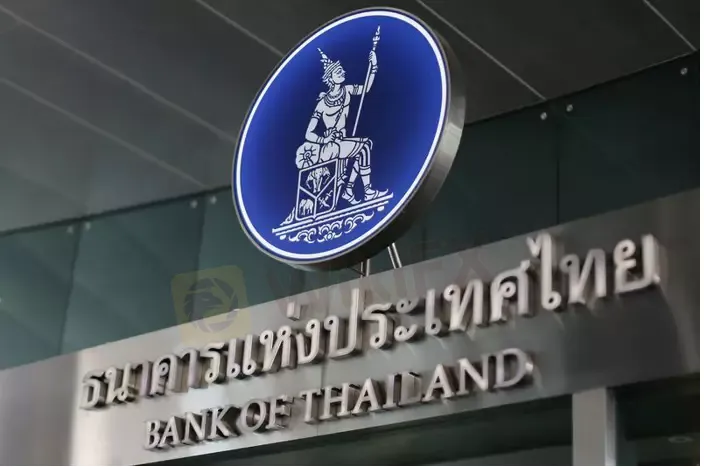简体中文
繁體中文
English
Pусский
日本語
ภาษาไทย
Tiếng Việt
Bahasa Indonesia
Español
हिन्दी
Filippiiniläinen
Français
Deutsch
Português
Türkçe
한국어
العربية
Thailand hikes rate for first time since 2018 to tame hot inflation
Abstract:Thailand’s central bank raised its key interest rate for the first time in nearly four years on Wednesday, lifting it by a quarter point as expected to fight surging inflation as the economic recovery gains momentum.

The Bank of Thailand (BOT), which had been among Asias least hawkish central banks, finally joined most of its peers, raising its one-day repurchase rate to 0.75% from0.50% as consumer inflation hovers near 14-year highs.
Its monetary policy committee (MPC) said further hikes would be carried out “in a gradual and measured manner consistent with the growth and inflation outlook”.
A director at the banks Financial Stability Department, Don Nakornthab, said the rate was still low compared with an average of 2% over the past two decades, “so it will take a while to reach that level”.
The Southeast Asian country had maintained its policy focus on supporting the economic recovery, which has lagged its neighbours due mainly to tourism curbs during the COVID-19 pandemic. The vital tourism sector has just begun to recover as restrictions were eased.
Driven by energy prices, consumer prices rose 7.61% in July from a year earlier, far above the BOTs target range of 1-3%.
The bank said it expected inflation to remain high for the rest of the year before gradually falling to its target range in 2023 as supply-side price pressures eased.
Tourism rebound
The MPC voted 6-1 for the quarter point hike in the benchmark rate from the record low it had been at since May 2020.
One member voted to raise the rate by 50 basis points, saying that would reduce the risk of aggressive tightening later on and adding that such a rate increase will not significantly affect the economic recovery.
The rate was last raised in December 2018.
Seventeen of 20 economists surveyed by Reuters had expected a quarter-point hike, with the remainder forecasting a half-point rise.
“The Thai economy is projected to continue recovering with strong momentum” from higher-than-expected foreign tourism activity, Piti Disyatat, secretary of the MPC, said in a statement https://www.bot.or.th/English/PressandSpeeches/Press/2022/Pages/n4065.aspx.
It should return to its pre-COVID level by the end of 2022 “and will continue to gain traction”, he added.
He said the BOT may revise up its 2022 economic growth forecast of 3.3% when it reviews it next month, with foreign tourist numbers expected to beat its forecast of 6 million this year.
The Thai economy expanded 1.5% last year, among the slowest in Southeast Asia.
“If inflation continues to weaken as we expect and growth struggles, the central bank will take a gradual approach to its tightening cycle. We think rates will peak at 1.5% next year,” Gareth Leather of Capital Economics said.
Miguel Chanco, chief Emerging Asia economist at Pantheon Macroeconomics, said Wednesdays hike was “inevitable and long overdue” and will be followed by another 25 bps move next month.
“That said, if the MPC decides to pause in September, then a hike in November probably should be ruled out, as the inflation picture wouldve improved substantially..”

Disclaimer:
The views in this article only represent the author's personal views, and do not constitute investment advice on this platform. This platform does not guarantee the accuracy, completeness and timeliness of the information in the article, and will not be liable for any loss caused by the use of or reliance on the information in the article.
Read more

Why More People Are Trading Online Today?
Discover why online trading is booming with tech, AI, and a push for financial freedom. From stocks to crypto, it’s a thrilling hustle for all.

Bitpanda Secures Full Broker-Dealer License in Dubai
Bitpanda has officially obtained a full broker-dealer license from the Dubai Virtual Assets Regulatory Authority (VARA), marking a significant milestone in its international expansion. This approval, which follows preliminary authorization granted three months earlier, enables the European digital asset exchange to introduce its comprehensive suite of virtual asset services to investors in the United Arab Emirates (UAE).

RM457,000 Forex Fraud: Court Grants Conditional Release, Is Justice Delayed?
A Malaysian magistrate’s court has issued a discharge not amounting to acquittal (DNAA) for two former directors of an investment company implicated in a forex investment fraud case involving RM457,735.50.

Interactive Brokers Expands Crypto Trading with Solana, XRP, Cardano, and Dogecoin
Interactive Brokers adds Solana, XRP, Cardano, and Dogecoin to its platform, enabling U.S. and U.K. clients to trade crypto 24/7 with low fees.
WikiFX Broker
Latest News
Enlighten Securities Penalized $5 Million as SFC Uncovers Risk Control Failures
Why Are Financial Firms Adopting Stablecoins to Enhance Services and Stability?
Experienced Forex Traders Usually Do This Before Making a Lot of Money
Octa vs XM:Face-Off: A Detailed Comparison
When High Returns Go Wrong: How a Finance Manager Lost RM364,000
Bridging Trust, Exploring Best—WikiEXPO Hong Kong 2025 Wraps Up Spectacularly
Fidelity Investments Explores Stablecoin Innovation in Digital Assets Sector
Interactive Brokers Expands Crypto Trading with Solana, XRP, Cardano, and Dogecoin
SEC Ends Crypto.com Probe, No Action Taken by Regulator
Why More People Are Trading Online Today?
Currency Calculator







